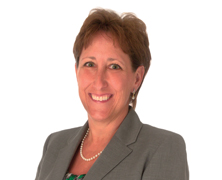When I was the youngest executive at Atlantic City Electric, a Pepco Holdings, Inc. (PHI) utility, one of our senior vice presidents advised me to “reach high, think big.” To put that lofty notion into practice, I focus on being better today than yesterday—a philosophy I apply to myself and my teams.
I decided that defining success from a team perspective and not a personal perspective worked best for me. The diverse opportunities I’ve been given have reinforced this belief. Over my twenty-three-year career at PHI, I have held ten different executive positions, including being the first woman to run our gas division. I also led a corporate reorganization project for PHI’s CEO, and I am now sponsoring a customer billing system implementation project.
I understand the value of a good team and good teammates. I believe the most important role of the leader is to build a strong team. My role is to support the team by providing clear direction on what is expected, coaching frequently, and removing obstacles that impede success. My primary job is not to be the expert with the answers but to empower those closer to the work and the customer.
For me, a key element of a productive team is a formalized accountability plan that has a limited number of focus areas, establishes specific initiatives, and defines goals and those accountable for them. The process for developing this plan must be collaborative or it puts overall alignment at risk.
I have learned that leading by asking questions is effective, especially with subject matter experts. It shows you respect their talent, you are interested in their thoughts, and that you expect your team to be thinkers and problem solvers. This is a skill that I rely on frequently.
My most important career lesson is that how you work is just as important as what you achieve. Attaining results is not about reaching a goal at any cost. Different behaviors drive different results, and better behavior oftentimes generates better results. I try to think about that every day.
I think about that senior vice president from time to time and hope that, in some way, my actions here at PHI have positively influenced my team’s view on leadership.
How has education affected your career?
After struggling academically at Ohio University, I gave up an athletic scholarship, transferred to Rutgers, and changed majors, which turned out to be a gift. I pursued a degree in accounting and found myself much more academically focused. I spent much time working on group projects, and from those experiences, I learned to collaborate, negotiate, and meet commitments to others.
What advice would you give young women building/preparing for a career?
Seize every opportunity presented to you, whether it’s a special project, a new assignment, or a promotion, then deliver exceptional results. Learn to communicate effectively. Be concise yet informative. Hone the skill of taking data and turning that into useful information. Finally, build relationships with others. Companies are like communities—the deeper your network, the more you will understand how your work impacts others.







